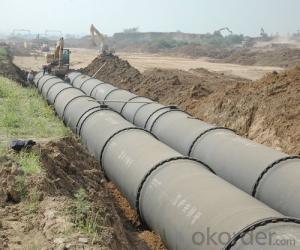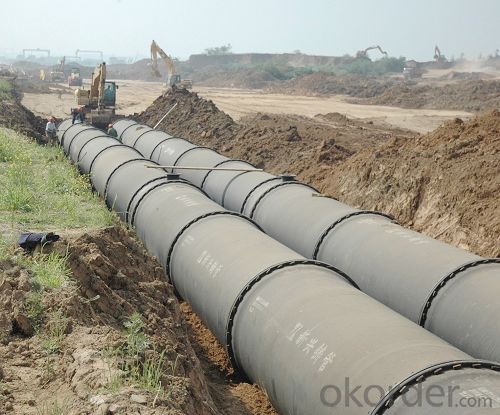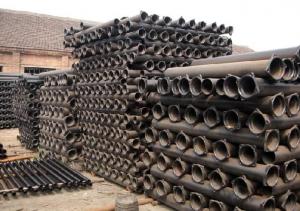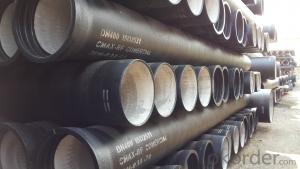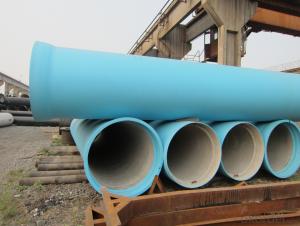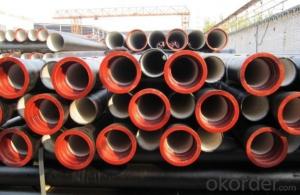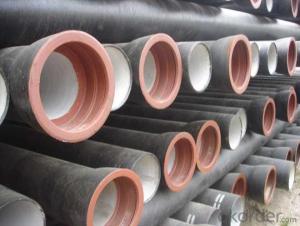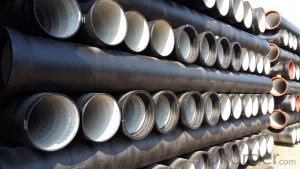Ductile Iron Pipe of China DN250-DN500 EN545 High Quality Chip Price
- Loading Port:
- China main port
- Payment Terms:
- TT or LC
- Min Order Qty:
- 20 m.t.
- Supply Capability:
- 100000 m.t./month
OKorder Service Pledge
OKorder Financial Service
You Might Also Like
1,Ductile Iron Pipe Description :
1) Pipes confirm to ISO2531,K9 class,T type joint,6m long,with inside cements lining conform to ISO4179, outside Zinc spraying(130g/m2) and bitumen coating(70μm) conform to ISO8179.
2) Pipe ends: Spigot and socket ends, with 100% SBR rubber gaskets accoding to ISO4633
3) we can do third party inspection according to customer's request.
4) Our products have been sold to many international market,such as Middle East and South East Asia and Africa.
2,Main Features of the Ductile Iron Pipe:
·High yield strength
·High tensile Strength
·High corrosion resistance
·Pressure Resistence
·Anti-corrosion
·Installation is convenient
·Satisfy the highest hygienic standards
Place of Origin: China (Mainland)
Model Number: DN80-1600 Length: 6M/5.7M/NEGOTIATED Standard: ISO2531 / EN545
Application: Potable/Sewage Water
Diameter: DN80-1600
Shape: Round
Hardness: 230 Pipe
Wall Thickness: standerd
Pull Strength: 420
Yield (≥ MPa): 300
Material: Ductile Iron water ductile iron pipe: SO2531 / EN545 DI pipe
3,Ductile Iron Pipe Images:
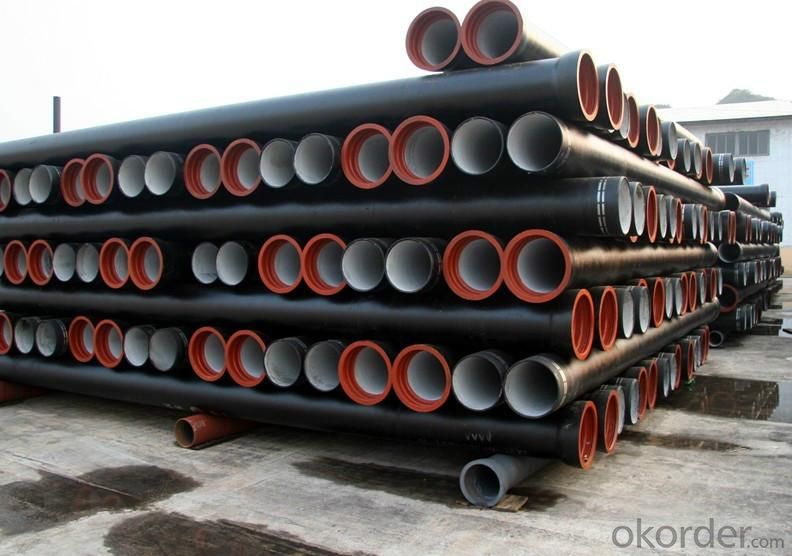
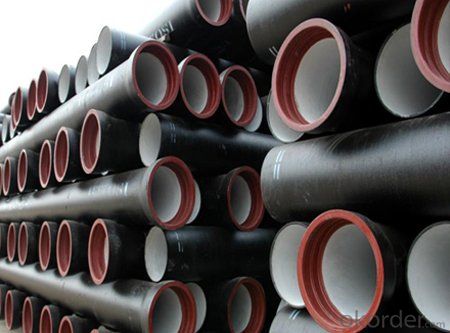
4. Ductile Iron Pipe Specification
Surface Finishes:Bare, Oiled, Mill Varnish, Galv,FBE, FBE Dual, 3LPE, 3LPP, Coal Tar,Concrete Coating and Tape Wrap
End Finishes: Beveled, Square Cut, Threaded, hat
Additional Services: Internal Coating
Packaging: packed in bag, plastic bag, steel strip, steel wire,double wire, iron box, wooden box,
tarpaulin, plastic sheeting
Inspection: MOODY SGS BV GL DNV ABS LIOYD’S
Test :X-ray, UT, magnetic particle,inspection,hydrostatic test.
Processing service :Beveling, Threading, Slotting, Cut-to length, Bends, Quench and Temper, Fabrication, Double-jointing and On-site assistance
5.FAQ:
We have organized several common questions for our clients,may help you sincerely:
1.Q: Why would you choose ductile iron pipe rather than other pipe materials?
A:The reasons are obvious for that not only ductile iron pipe possesses the inherent strength and flexibility of ductile iron, combined with proven corrosion protection systems, but also the cost savings can be achieved from design to installation and commissioning.
2.Q:Why can you guarantee the inner of pipes can’t be corroded?
A: High alumina cement mortar lining and sulphate-resistant cement mortar lining. These two special linings are applicable to inner anti-corrosion for sewage pipes, improving resistance to erosion of the sewage components.
- Q: Can ductile iron pipes be used for irrigation canal lining?
- Yes, ductile iron pipes can be used for irrigation canal lining. Ductile iron pipes are known for their strength, durability, and resistance to external pressure and impact. These qualities make them suitable for use in irrigation canal lining, as they can withstand the harsh conditions of the environment such as high water pressure, soil movement, and exposure to chemicals and corrosive elements. Ductile iron pipes also have a smooth interior surface, which allows for efficient water flow and reduces the risk of clogging or sediment buildup. This is important for irrigation canals, as it ensures a continuous supply of water to the crops or plants being irrigated. Additionally, ductile iron pipes are highly resistant to damage from external factors such as roots, rocks, or other objects that may come into contact with the canal lining. This helps to minimize the risk of leaks or breaks in the irrigation system, ensuring a reliable and efficient irrigation process. It is worth noting that the selection of ductile iron pipes for irrigation canal lining should take into account factors such as the size and capacity of the canal, the water pressure requirements, and the specific conditions of the irrigation project. Consulting with a professional engineer or irrigation specialist can help determine the most suitable materials for the specific requirements of the project.
- Q: Is the cast iron pipe buried in need of antiseptic treatment? What kind of anticorrosive materials are used?
- Is to put the pipe surface rust corrosion, polished clean, brush again primer, and then wrapped a layer of glass cloth wrapped paint, two layers of glass cloth on the line, the thickness of not less than 6mm, painted with epoxy coal tar paint or asphalt paint
- Q: Can ductile iron pipes be used for geothermal systems?
- Yes, ductile iron pipes can be used for geothermal systems. Ductile iron pipes have excellent strength and durability, making them suitable for handling the high temperatures and pressures typically encountered in geothermal systems. Their corrosion resistance and flexibility also make them a reliable choice for transporting geothermal fluid efficiently.
- Q: Can ductile iron pipes be used for wastewater pumping stations?
- Indeed, wastewater pumping stations can utilize ductile iron pipes. With their remarkable strength and durability, ductile iron pipes are well-suited for transporting wastewater and effectively managing the immense pressures and corrosive properties of sewage. Furthermore, the smooth interior surface of ductile iron pipes prevents blockages and facilitates the efficient flow of wastewater. Moreover, these pipes exhibit resistance towards external forces like soil displacement or heavy vehicular movement, thereby establishing themselves as a dependable option for wastewater pumping stations.
- Q: Are ductile iron pipes suitable for pressure sewer systems?
- Yes, ductile iron pipes are suitable for pressure sewer systems. Ductile iron pipes have been widely used in various applications, including pressure sewer systems, due to their high strength and durability. These pipes are able to withstand high pressure and provide a reliable and long-lasting solution for transporting sewage under pressure. Ductile iron pipes also have excellent corrosion resistance, which is crucial in sewer systems where they are exposed to various chemicals and contaminants. They are resistant to both internal and external corrosion, ensuring that the pipes remain intact and functional over time. Furthermore, ductile iron pipes have a smooth internal surface, which helps to minimize friction and improve the flow capacity of the sewer system. This ensures that the pipes can handle the required flow rates and prevent any blockages or backups. In addition to their strength and corrosion resistance, ductile iron pipes are also known for their ease of installation. They can be easily cut and joined using a variety of methods, making them a convenient choice for pressure sewer systems. Overall, ductile iron pipes are a suitable and reliable choice for pressure sewer systems due to their high strength, corrosion resistance, smooth internal surface, and ease of installation.
- Q: How is ductile iron pipe tested for quality?
- Ductile iron pipe is tested for quality through various methods, including visual inspection, hydrostatic pressure testing, and mechanical property testing. Visual inspection ensures that the pipe is free from any visible defects or imperfections. Hydrostatic pressure testing involves subjecting the pipe to water pressure that exceeds its maximum working pressure to check for any leaks or failures. Mechanical property testing assesses the pipe's strength, toughness, and other mechanical properties through tests such as tensile strength, yield strength, and elongation. These quality tests help ensure that ductile iron pipes meet the required standards and are suitable for their intended applications.
- Q: Can ductile iron pipes be used for water supply in buildings?
- Yes, ductile iron pipes can be used for water supply in buildings. Ductile iron pipes are known for their strength, durability, and corrosion resistance, making them suitable for carrying water in both residential and commercial structures. They have a long lifespan, high pressure rating, and can withstand various environmental conditions, making them a reliable choice for water distribution systems.
- Q: Disadvantages of ductile iron pipes
- In most municipal applications, such as water, brine, steam, ductile iron has more corrosion resistance and oxidation resistance than cast steel. Because of the spheroidal graphite microstructure of nodular cast iron, nodular cast iron is superior to cast steel in reducing vibration ability, so it is more beneficial to reduce stress. An important reason for choosing ductile iron is that ductile iron costs less than cast steel.
- Q: What are the different types of joints available for ductile iron pipe?
- Ductile iron pipes offer various types of joints, each with distinct advantages and suitability for different uses. Here are some of the most common joint options available: 1. Mechanical Joints: These joints create a watertight seal using a mechanical joint gland and rubber gasket. They are easy to install and allow for quick disassembly if needed. 2. Push-on Joints: This joint type involves compressing a rubber gasket when inserting the pipe into the fitting. It provides a reliable seal and requires no special tools for installation. 3. Restrained Joints: Designed to withstand higher internal pressures, restrained joints use a combination of mechanical or push-on joints along with additional restraints like thrust blocks or harnesses to prevent pipe separation. 4. Flanged Joints: Flanged joints connect two pipes using flanges and bolts. They are commonly used when frequent disassembly is required or when connecting to different types of pipes or equipment. 5. Welded Joints: In certain cases, ductile iron pipes can be welded together to create a strong and permanent connection. Welded joints are typically used in larger diameter pipes or specialized applications requiring high strength. When selecting the appropriate joint type for ductile iron pipes, it is essential to consider factors such as the pipe's application, pressure rating, and installation requirements.
- Q: What is the expected external protection system for ductile iron pipes?
- The expected external protection system for ductile iron pipes typically includes a combination of coatings and cathodic protection. Coatings, such as fusion-bonded epoxy (FBE) or polyethylene, are applied to the external surface of the pipe to provide a barrier against corrosion and protect it from the surrounding environment. These coatings are highly resistant to moisture, chemicals, and abrasion, ensuring the longevity of the pipe. In addition to coatings, cathodic protection is often employed to further enhance the external protection of ductile iron pipes. Cathodic protection involves the use of sacrificial anodes or impressed current systems to create a protective electrical current that counteracts the corrosive effects on the pipe's surface. This technique helps prevent corrosion by ensuring that the ductile iron remains in a cathodic state, where it is less prone to degradation. The combination of coatings and cathodic protection provides a robust and comprehensive external protection system for ductile iron pipes. These measures effectively safeguard the pipes from corrosion, extending their service life and minimizing the need for costly repairs or replacements. Regular inspection and maintenance are also essential to ensure the ongoing effectiveness of the external protection system and to address any potential issues promptly.
Send your message to us
Ductile Iron Pipe of China DN250-DN500 EN545 High Quality Chip Price
- Loading Port:
- China main port
- Payment Terms:
- TT or LC
- Min Order Qty:
- 20 m.t.
- Supply Capability:
- 100000 m.t./month
OKorder Service Pledge
OKorder Financial Service
Similar products
Hot products
Hot Searches
Related keywords
